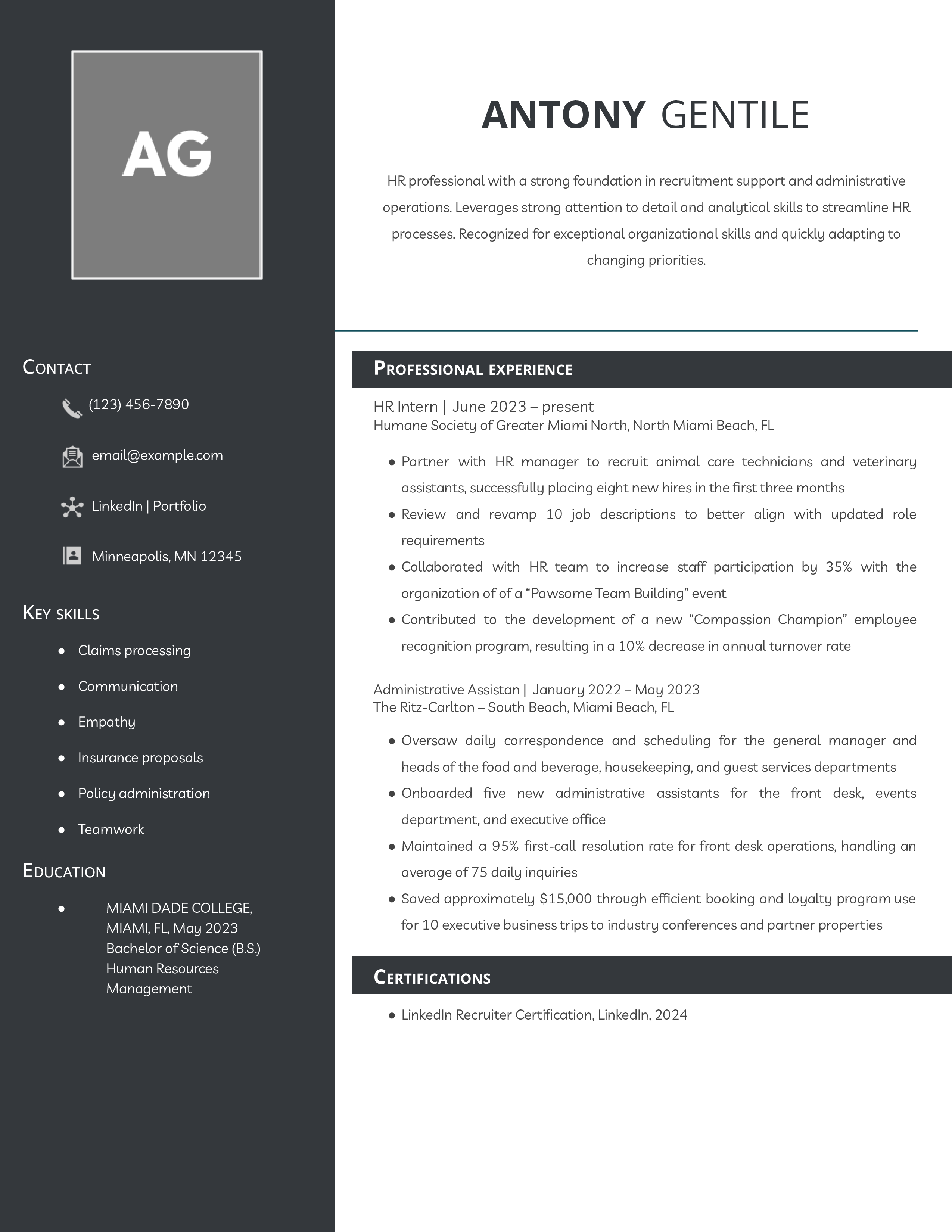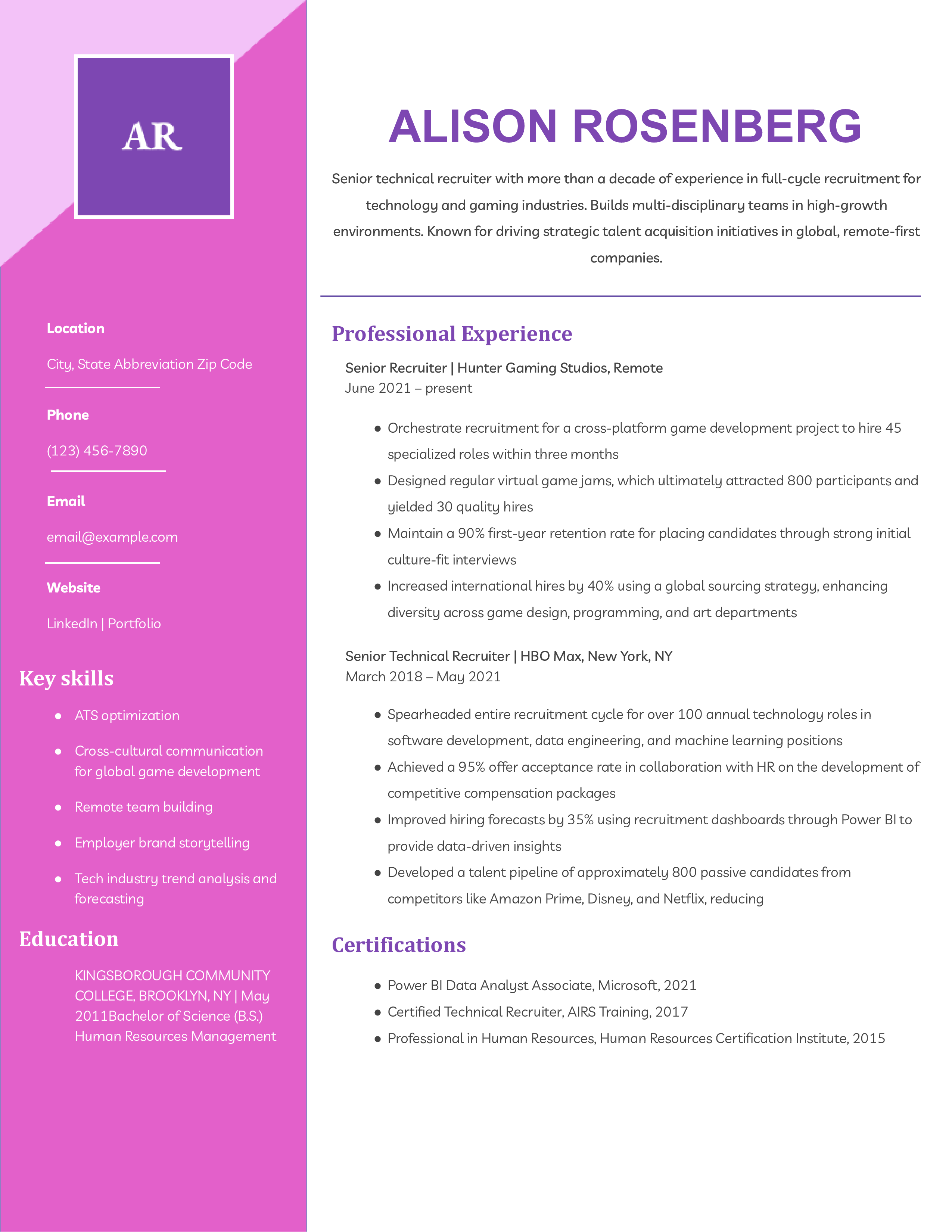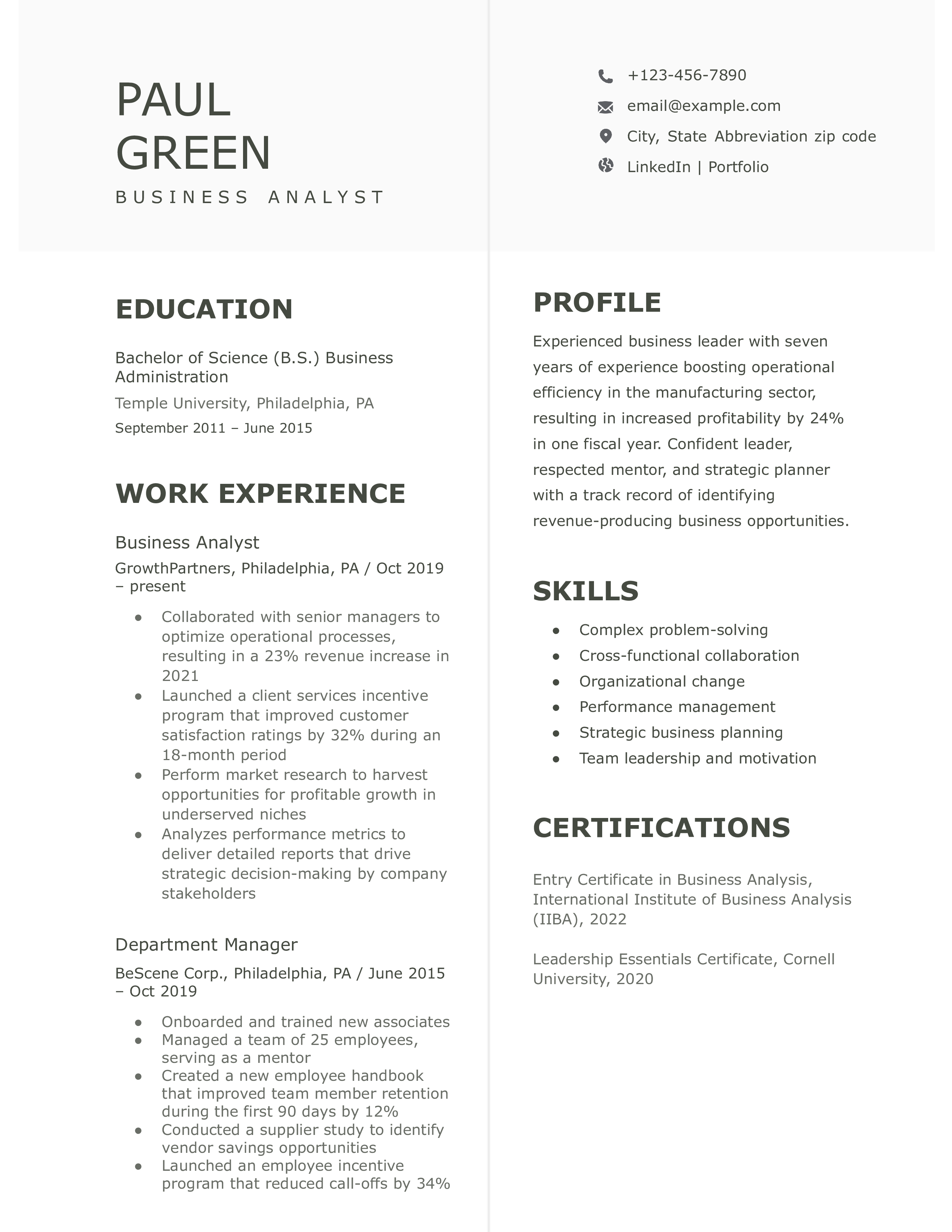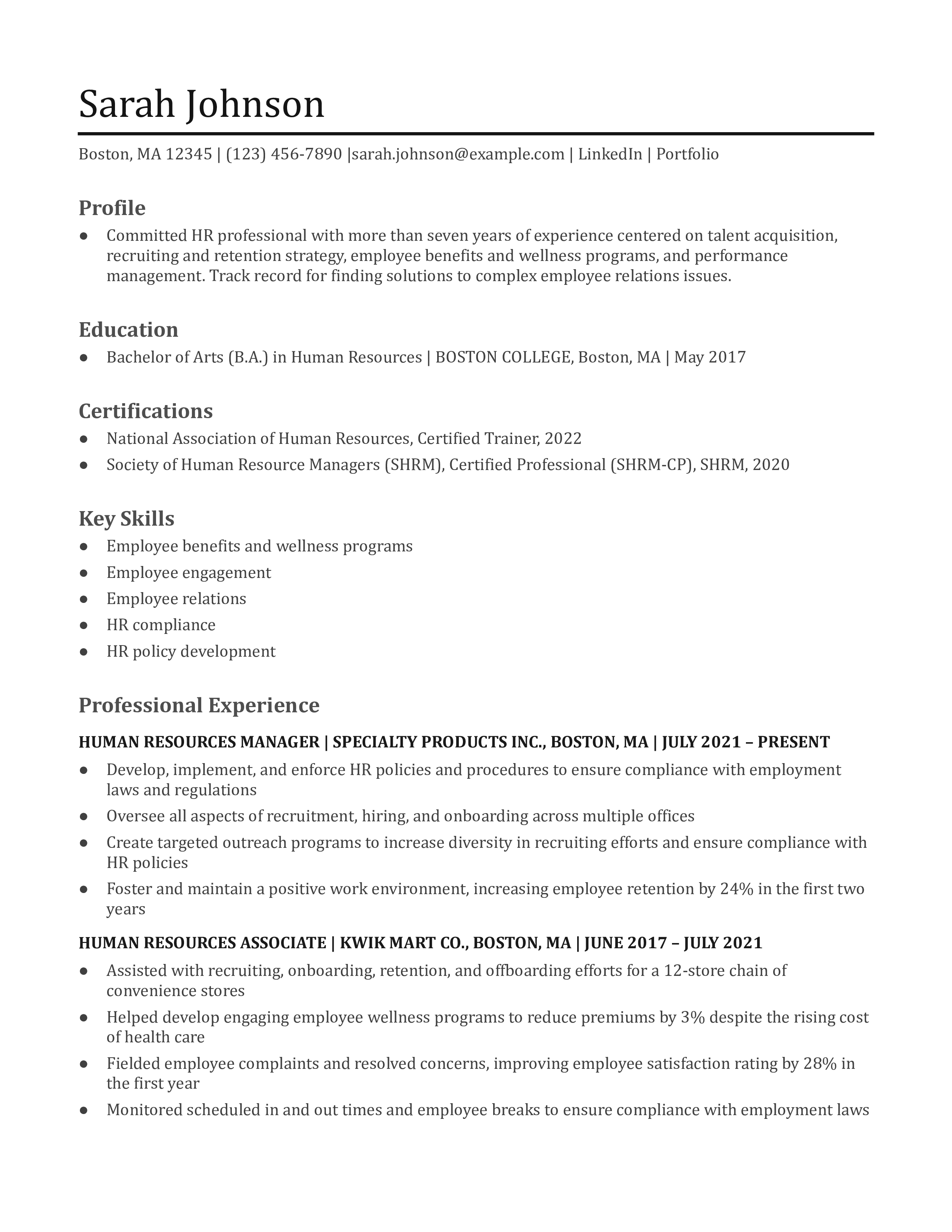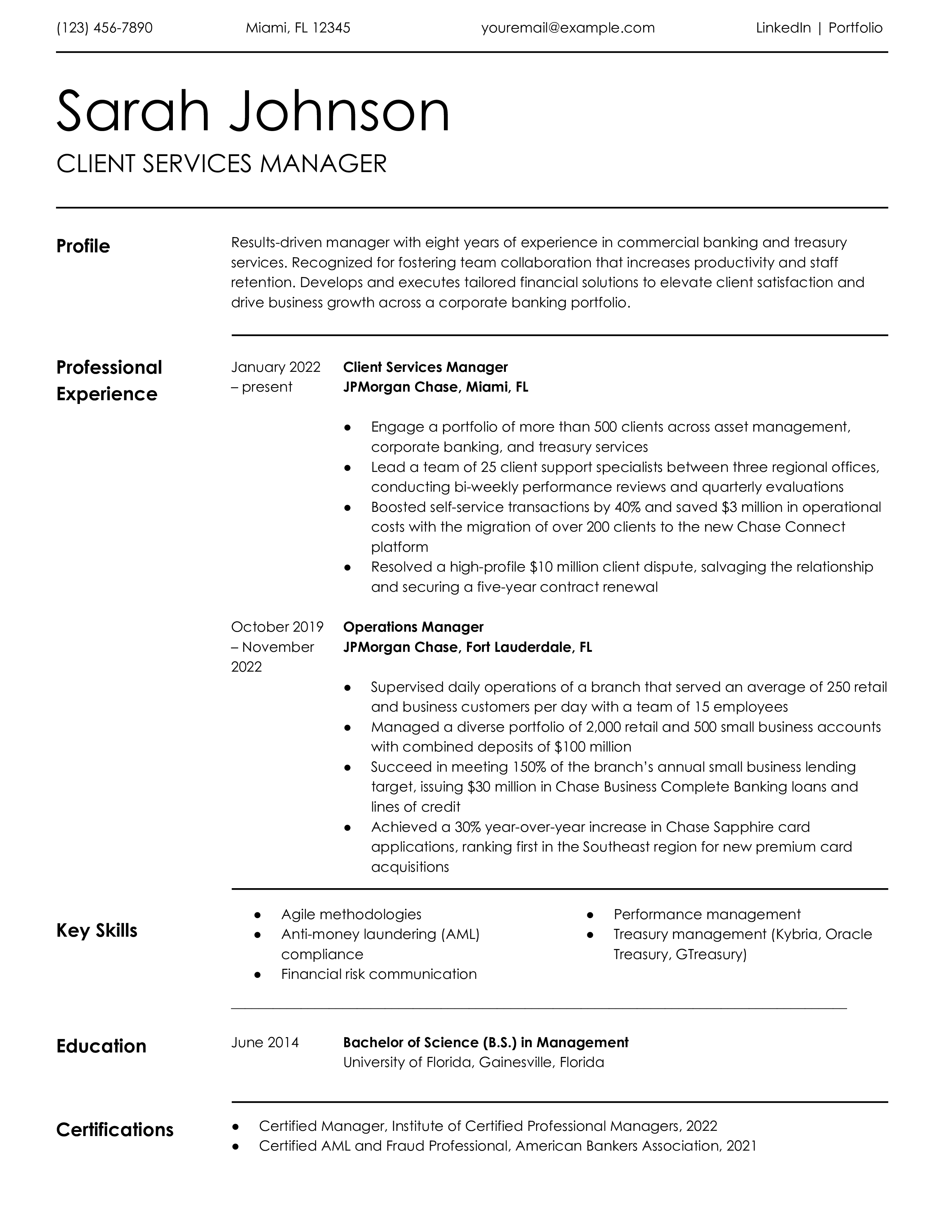Recruiter Resume Examples and Templates (Downloadable)
- Entry-Level Recruiter
- Mid-Level Recruiter
- Senior-Level Recruiter
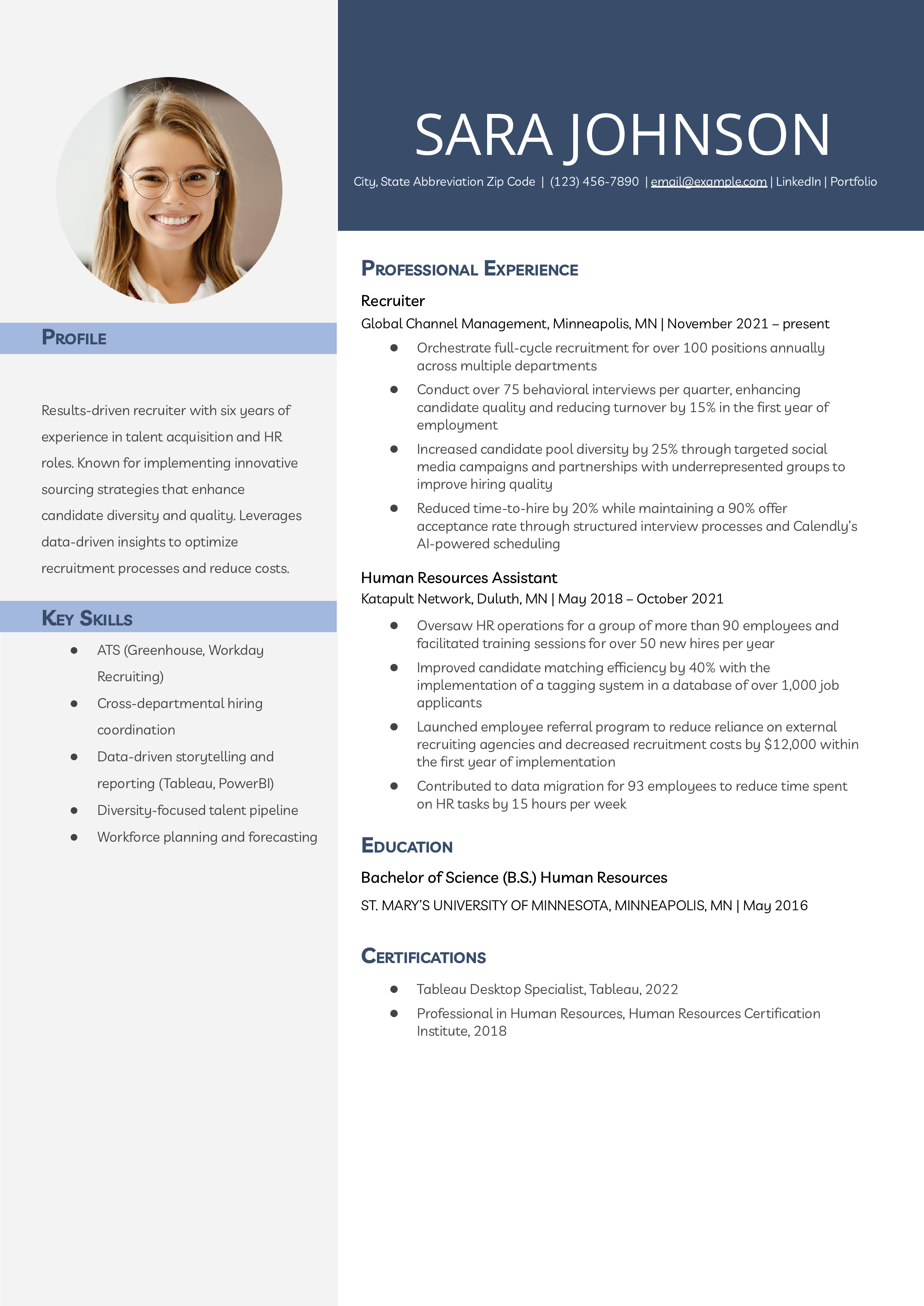
As a recruiter, you have a unique advantage in the job-hunting process — you know what hiring managers are looking for in a resume. In this guide, we’ll provide expert tips to help you write a recruiter resume that reflects your ability to source, screen, and hire top talent.
Key takeaways:
- Highlight recruiting expertise: Specify the focus of your recruiting efforts and unique value proposition in the profile section. Positioning your strengths at the top of the page grabs the attention of hiring managers and sets the stage for your resume
- Quantify placement success: Pull metrics from your past success in talent acquisition to use throughout the professional experience section. Hiring managers are interested in results, and these numbers provide concrete evidence of your success.
- Use industry-specific keywords: Include keywords from the job description in your resume to ensure it passes through applicant tracking systems (ATS). Match your recruiting skills with those mentioned by potential employers to show you can meet their needs.
How To Write a Recruiter Resume Example
Your recruiter resume must show hiring managers that you can bridge the gap between employers and potential employees. To ensure you cover all your most compelling career facts, use a professional resume template. The template should include the following sections:
- Contact information
- Profile
- Key skills
- Professional experience
- Education and certifications
1. Share your contact information
At the top of your resume, list your full name, phone number, email address, location, and links to your online professional recruiter profile. Feature this information prominently at the top of your resume so hiring managers know how to contact you to schedule an interview.
Example
Your Name
(123) 456-7890
email@example.com
City, State Abbreviation Zip Code
LinkedIn
2. Craft a dynamic profile summarizing your qualifications
Your profile is a concise summary that encompasses your professional identity. Start with your job title, years of experience, and industry knowledge. Follow up with a few sentences that mention your strengths and recurring achievements that set you apart from other recruiters.
For instance, if you’re a tech recruiter and can source hard-to-find developers or uncover top-tier candidates from niche job boards, mention that. Or, maybe you’re responsible for filling executive openings. Highlight your success in placing C-suite leaders that have impacted company growth. Tailor this section to what the company needs.
Senior-Level Profile Example
Senior technical recruiter with more than a decade of experience in full-cycle recruitment for technology and gaming industries. Builds multi-disciplinary teams in high-growth environments. Known for driving strategic talent acquisition initiatives in global, remote-first companies.
Entry-Level Profile Example
Human resources (HR) professional with a strong foundation in recruitment support and administrative operations. Leverages strong attention to detail and analytical skills to streamline HR processes. Recognized for organizational skills and quickly adapting to changing priorities.
3. Add a compelling section featuring your recruiting experience
The professional experience section should highlight your past success in recruiting. Get into the specifics of what you did in each role, but also think about what you achieved. Did you lead a recruitment drive? Implement new ATS software? Show hiring managers what they gain if they hire you, using numbers to quantify your experience.
Although it’s up to you to source and screen candidates, you rely on a team of experts to close the deal. Remember to include examples of how you worked closely with marketing teams and department heads to improve the talent acquisition process.
Senior-Level Professional Experience Example
Senior Recruiter, Hunter Gaming Studios, Remote
June 2021 – present
- Orchestrated recruitment for a cross-platform game development project to hire 45 specialized roles within three months
- Design regular virtual game jams, which ultimately attracted 800 participants and yielded 30 quality hires
- Maintain a 90% first-year retention rate for placing candidates through strong initial culture-fit interviews
- Increased international hires by 40% using a global sourcing strategy, enhancing diversity across game design, programming, and art departments
Entry-Level Professional Experience Example
HR Intern, Humane Society of Greater Miami North, North Miami Beach, FL
June 2023 – present
- Partner with HR manager to recruit animal care technicians and veterinary assistants, successfully placing eight new hires in the first three months
- Review and revamp 10 job descriptions to better align with updated role requirements
- Collaborated with HR team to increase staff participation by 35% with the organization of of a “Pawsome Team Building” event
- Contributed to the development of a new “Compassion Champion” employee recognition program, resulting in a 10% decrease in annual turnover rate
Resume writer’s tip: Quantify your experience
In the recruitment field, success often comes down to numbers — be it reducing time-to-fill positions, increasing retention rates, or meeting diversity hiring targets. Quantifying past job descriptions will help you illustrate your ability to deliver on these goals. Use numbers, percentages, and dollar amounts to demonstrate your effectiveness and efficiency as a recruiter.
Do
- “Improved candidate matching efficiency by 40% with the implementation of a tagging system in a database of over 1,000 job applicants”
Don’t
- “Maintained a large database of job applicants with a tagging system”
Resume writer’s tip: Tailor your resume for each application
Recruiters know firsthand how quickly hiring managers can scan an application, and that’s why tailoring your resume for every job is vital. Just like you wouldn’t send the same candidate shortlist to every client, don’t submit an identical resume for each company. Consider what the employer is looking for and how you can speak to their needs.
For example, say you’re applying for a position in health care, and the job ad mentions “experience with travel nursing placements.” You could highlight a hiring campaign in which you staffed multiple hospitals during a seasonal surge. Mention your familiarity with state-specific licensing, which allows you to quickly match nurses to short-term contracts. Whatever the case, demonstrate how you can meet the job’s unique demands.
What if you don’t have experience?
As an entry-level recruiter, you can leverage education and transferable skills. Your work will require more than extensive technical experience. So, emphasize your ability to communicate, empathize, and negotiate. If you have examples from past experiences that demonstrate these skills, make sure to include them.
Think of times you’ve had to work with people, organize events, or manage projects. This could be volunteer work, internships, or even group projects in school. Describe these experiences in a way that communicates any skills related to recruiting, such as team collaboration, managing deadlines, and relevant software proficiencies.
Also, if you’ve taken courses or are certified in areas related to HR, psychology, or business, include these as well.
4. List any education and certifications relevant to recruiting
Many recruiter jobs require at least a bachelor’s degree in a field like HR management or business. So, list your highest level of education and consider detailing some of your relevant coursework, especially if you’re an entry-level recruiter.
Next, include special credentials you may have, like a Professional in Human Resources (PHR) certificate or a LinkedIn Certified Professional Recruiter badge. These extra endorsements may not always be required, but they can certainly help distinguish you from other high-performing recruiters.
Education
Template:
[Degree Name]
[School Name], [City, State Abbreviation] | [Graduation Year]
Example:
Bachelor of Science (B.S.) Human Resources
St. Mary’s University of Minnesota, Minneapolis, MN | May 2016
Certifications
Template:
[Certification Name], [Awarding Organization], [Completion Year]
Examples:
Professional in Human Resources, Human Resources Certification Institute, 2018
5. Make a list of your recruiter-related skills and proficiencies
In recruitment, you use a wide range of skills — from confident communication to understanding complex HR software. Highlighting these skills demonstrates the depth of your knowledge and shows you’re well-equipped for the challenges of each role you apply for. Be sure to include both hard and soft skills to illustrate your versatility, making you a more attractive candidate.
| Hard Skills | |
|---|---|
| Artificial intelligence (AI) tools (HireVue, Pymetrics, Ideal) | ATS (Workday, Taleo, Greenhouse) |
| Boolean search techniques | Candidate sourcing (LinkedIn Recruiter, SeekOut, Entelo) |
| Interview techniques | Relationship management (Salesforce, Bullhorn, Avature) |
| Social media recruiting (Facebook, Twitter, Instagram) | Talent pipeline building |
| Technical recruitment | |
| Soft Skills | |
|---|---|
| Candidate relationship building | Cross-cultural communication |
| Employer brand storytelling | Hiring manager coaching |
| Onboarding and training | Passive talent engagement |
| Salary negotiation | Talent community management |
Resume writer’s tip: Use common action verbs
Action verbs can help you convey to hiring managers that you actively seek, attract, and hire top talent. Use these dynamic words in the professional experience section, starting each bullet point with a verb. To instantly add energy and clarity to your recruiter resume, use the following words to describe your past work:
| Action Verbs | |
|---|---|
| Acquired | Assessed |
| Attracted | Collaborated |
| Connected | Engaged |
| Interviewed | Networked |
| Recruited | Scouted |
| Screened | Sourced |
| Targeted | Vetted |
How To Pick the Best Recruiter Resume Template
To help you make a positive first impression on hiring managers, choose a resume template that emphasizes your content without detracting from it. A modern resume template is a great choice for recruiters. With a focus on simplicity and efficiency, its contemporary style conveys a professional aesthetic. Be mindful of your industry when selecting a template. While colorful and bright may work for a creative market, it might not land well in finance or health care.
Recruiter Text-Only Resume Examples and Templates
Anthony Gentile
(123) 456-7890
youremail@example.com
Miami, FL 12345
LinkedIn | Portfolio
Profile
HR professional with a strong foundation in recruitment support and administrative operations. Leverages strong attention to detail and analytical skills to streamline HR processes. Recognized for exceptional organizational skills and quickly adapting to changing priorities.
Professional Experience
HR Intern, Humane Society of Greater Miami North, North Miami Beach, FL
June 2023 – present
- Partner with HR manager to recruit animal care technicians and veterinary assistants, successfully placing eight new hires in the first three months
- Review and revamp 10 job descriptions to better align with updated role requirements
- Collaborated with HR team to increase staff participation by 35% with the organization of of a “Pawsome Team Building” event
- Contributed to the development of a new “Compassion Champion” employee recognition program, resulting in a 10% decrease in annual turnover rate
Administrative Assistant, The Ritz-Carlton – South Beach, Miami Beach, FL
January 2022 – May 2023
- Oversaw daily correspondence and scheduling for the general manager and heads of the food and beverage, housekeeping, and guest services departments
- Onboarded five new administrative assistants for the front desk, events department, and executive office
- Maintained a 95% first-call resolution rate for front desk operations, handling an average of 75 daily inquiries
- Saved approximately $15,000 through efficient booking and loyalty program use for 10 executive business trips to industry conferences and partner properties
Key Skills
- Employer brand messaging
- Job description optimization
- HR information system (BambooHR)
- Nonprofit HR compliance
- Offer negotiation and closing techniques
Education
Bachelor of Science (B.S.) Human Resources Management, May 2023
Miami Dade College, Miami, FL
Certifications
- LinkedIn Recruiter Certification, LinkedIn, 2024
Frequently Asked Questions: Recruiter Resume Examples and Advice
How do you align your resume with a recruiter job description?
The job market for HR specialists (recruiters included) is expected to grow at a faster-than-average rate. There will be plenty of opportunities to land a new role, but competition will be stiff for the best positions. You’ll need a recruiter resume tailored to perfection to stand out from the rest.
As you likely know, many companies use ATS software to filter resumes based on specific keywords and phrases. By tailoring your resume to include language from the job description, you increase your chances of getting past these digital gatekeepers and ultimately landing an interview. Pull keywords from the job description that match your recruiting skills and incorporate them organically throughout your resume to optimize your document.
What is the best recruiter resume format?
The chronological resume format works to a recruiter’s advantage. It presents your most recent and relevant experience as the focal point of the page. Featuring your responsibilities and achievements in a well-organized timeline makes it easy for hiring managers to see how you’ve grown and taken on more over the years.
While the chronological format is generally best, trust your recruiter instincts. If you’re making a significant career shift or returning after time away, a combination format might serve you better.
Include a cover letter with your resume
You’ve probably read countless cover letters in your time as a recruiter, and now it’s time to write your own. Think of it as your personalized pitch to the hiring manager that draws a connection between your recruiting expertise and the role you’re applying for. It should complement your resume without being redundant and describe why you’re the best candidate.
Check Out Related Examples
Resume Templates offers free, HR approved resume templates to help you create a professional resume in minutes. Choose from several template options and even pre-populate a resume from your profile.


